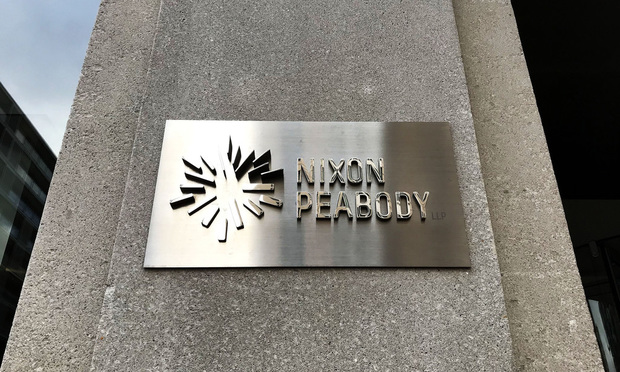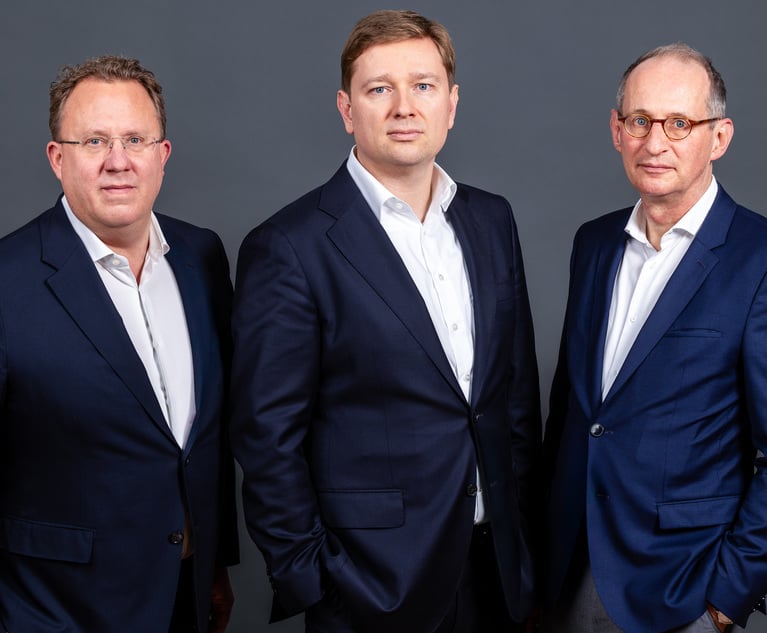In California, Lateral Moves No Longer Mean Automatic DQ
The Golden State has become the latest jurisdiction to not automatically grant lateral move-based disqualification motions.
May 22, 2018 at 05:51 PM
6 minute read

California has now joined almost all other states in that its courts have become more practical about evaluating conflicts of interest-based disqualification motions related to lateral hiring, said several lawyers who frequently represent law firms.
The Golden State joined the pack on May 10 when the California Supreme Court opted to not hear California Self-Insurers' Security Fund v. The Superior Court of Orange County, the lawyers said.
By doing so, California's top court let stand a lower appellate ruling that did not automatically disqualify a firm because of a lateral hire. Specifically, the appellate court did not assume that once a lateral attorney joined a new firm, his knowledge was automatically “imputed” to that firm's lawyers, thereby creating a conflict.
The specific lateral in question, Andrew Selesnick, had moved from Los Angeles-based Michelman & Robinson, which represented the defendants, to Nixon Peabody, which represented the plaintiffs. But Selesnick only stayed at Nixon Peabody for less than two months and claimed to have never worked during that time with a team of lawyers engaged in litigation involving both parties.
“This is all evolving because of the pragmatic realities and the practice of law is changing so much,” said Rebecca Lamberth, an Atlanta-based trial practice leader at Duane Morris who also serves in the firm's general counsel office, about courts' attitudes toward the development of potential conflicts due to lateral hiring.
The courts' more open-minded view about attorney moves applies mostly to large firms, among which much of the lateral movement takes place, Lamberth said. Large firms, because of their size, are also more capable than smaller firms of effectively setting up ethical screens that prevent certain lawyers that could pose a conflict or otherwise from having access to related materials, conversations and knowledge.
But that doesn't mean that large firms now have an advantage thanks to a change in court attitudes toward lateral moves and disqualifications, Lamberth said.
“The reality is that large firms are the ones that face this issue regularly and have been working to solve or address it through setting up Chinese walls,” she said. Lamberth noted that no such barriers could effectively be established in a 15-lawyer firm, although smaller firms often do not have the same volume of lateral hiring taking place.
Kevin Rosen, a litigation partner in the Los Angeles office of Gibson, Dunn & Crutcher and chairman of its law firm defense practice group, also paid close attention to the California ruling.
“The decision reflects a growing trend among a number of courts to take a more practical approach to conflict issues in certain areas, such as imputation,” he said.
By allowing the lower court's ruling to stand, the California Supreme Court moved its state's courts closer to the view that the majority of 49 other state courts have adopted on conflict questions. Most states' court have accepted versions of a rule of imputed disqualification as defined by the American Bar Association's Model Rules of Professional Conduct.
Typically, other states' rules don't automatically disqualify a firm if it hires a lawyer who represented an adverse party, but instead allow for ethical screens to be established under many circumstances. The underlying dispute in the California case was about workers' compensation claims and liabilities.
In the litigation, Nixon Peabody's client, the California Self-Insurers' Security Fund, an Oakland-based nonprofit quasi-state agency, was pitted against multiple defendants that are self-insured employers. (Federal tax filings show that the Self-Insurers' Security Fund paid $480,000 to Nixon Peabody in 2016-17.)
From 2009 to February 2017, Selesnick worked at Michelman & Robinson, where he handled claims for some of the defendants. On Feb. 1, 2017, he left the firm and joined Nixon Peabody in Los Angeles. Selesnick's stay would be short-lived.
After six weeks, he left Nixon Peabody's partnership on March 15, 2017, and joined Buchalter's Los Angeles office. According to a ruling earlier this year by the California Fourth District Court of Appeal that the California Supreme Court recently declined to review, when Selesnick was hired by Nixon Peabody, his former firm, Michelman & Robinson, quickly raised the potential conflict issue.
For his part, Selesnick claimed that the defendants he worked with at his old firm had all settled their respective claims before he headed to Nixon Peabody, and that he retained no confidential information from any of the parties still in the litigation. But the defendants filed a motion to disqualify Nixon Peabody, arguing that Selesnick's move to the firm created a conflict.
In response, Nixon Peabody argued that none of its lawyers received confidential information from Selesnick. The firm also claimed that Selesnick had been hired to work in its Los Angeles office, and the lawyers handling the underlying litigation were in San Francisco. Each Nixon Peabody team member filed a declaration stating they received no confidential information from Selesnick since the firm had erected an “ethical wall” once he came aboard.
Nicholas Roxborough, a name partner at Roxborough, Pomerance, Nye & Adreani in Woodland Hills, California, who at the trial court last year initially won a motion to disqualify Nixon Peabody from representing the plaintiff in the pending workers' compensation dispute as a result of its hire of Selesnick, has accepted his reversal in the appellate courts.
The ABA's professional conduct position “has been carrying the day” in states nationwide and now also in California, Roxborough said.
“The notion that you can switch sides in the middle of a litigation is troubling, but is consistent with the way courts are going,” Roxborough said. He noted that the disposition of the Nixon Peabody and Selesnick case will help “big firms where you can build Chinese walls,” but not much in the future for his 13-lawyer shop near Los Angeles.
This content has been archived. It is available through our partners, LexisNexis® and Bloomberg Law.
To view this content, please continue to their sites.
Not a Lexis Subscriber?
Subscribe Now
Not a Bloomberg Law Subscriber?
Subscribe Now
NOT FOR REPRINT
© 2025 ALM Global, LLC, All Rights Reserved. Request academic re-use from www.copyright.com. All other uses, submit a request to [email protected]. For more information visit Asset & Logo Licensing.
You Might Like
View All
DLA Piper Hires Former FAA Chief Counsel as Transportation Practice Co-Chair

Diversity Lab Alters DEI-Centered Verbiage on Mansfield Certification Website


Big Tech Is Cozying Up to President Trump. Here's Why Their Lawyers Are Cautiously Optimistic
Trending Stories
- 1Jury Seated in Glynn County Trial of Ex-Prosecutor Accused of Shielding Ahmaud Arbery's Killers
- 2Ex-Archegos CFO Gets 8-Year Prison Sentence for Fraud Scheme
- 3Judges Split Over Whether Indigent Prisoners Bringing Suit Must Each Pay Filing Fee
- 4Law Firms Report Wide Growth, Successful Billing Rate Increases and Less Merger Interest
- 5CLOs Face Mounting Pressure as Risks Mushroom and Job Duties Expand
Who Got The Work
J. Brugh Lower of Gibbons has entered an appearance for industrial equipment supplier Devco Corporation in a pending trademark infringement lawsuit. The suit, accusing the defendant of selling knock-off Graco products, was filed Dec. 18 in New Jersey District Court by Rivkin Radler on behalf of Graco Inc. and Graco Minnesota. The case, assigned to U.S. District Judge Zahid N. Quraishi, is 3:24-cv-11294, Graco Inc. et al v. Devco Corporation.
Who Got The Work
Rebecca Maller-Stein and Kent A. Yalowitz of Arnold & Porter Kaye Scholer have entered their appearances for Hanaco Venture Capital and its executives, Lior Prosor and David Frankel, in a pending securities lawsuit. The action, filed on Dec. 24 in New York Southern District Court by Zell, Aron & Co. on behalf of Goldeneye Advisors, accuses the defendants of negligently and fraudulently managing the plaintiff's $1 million investment. The case, assigned to U.S. District Judge Vernon S. Broderick, is 1:24-cv-09918, Goldeneye Advisors, LLC v. Hanaco Venture Capital, Ltd. et al.
Who Got The Work
Attorneys from A&O Shearman has stepped in as defense counsel for Toronto-Dominion Bank and other defendants in a pending securities class action. The suit, filed Dec. 11 in New York Southern District Court by Bleichmar Fonti & Auld, accuses the defendants of concealing the bank's 'pervasive' deficiencies in regards to its compliance with the Bank Secrecy Act and the quality of its anti-money laundering controls. The case, assigned to U.S. District Judge Arun Subramanian, is 1:24-cv-09445, Gonzalez v. The Toronto-Dominion Bank et al.
Who Got The Work
Crown Castle International, a Pennsylvania company providing shared communications infrastructure, has turned to Luke D. Wolf of Gordon Rees Scully Mansukhani to fend off a pending breach-of-contract lawsuit. The court action, filed Nov. 25 in Michigan Eastern District Court by Hooper Hathaway PC on behalf of The Town Residences LLC, accuses Crown Castle of failing to transfer approximately $30,000 in utility payments from T-Mobile in breach of a roof-top lease and assignment agreement. The case, assigned to U.S. District Judge Susan K. Declercq, is 2:24-cv-13131, The Town Residences LLC v. T-Mobile US, Inc. et al.
Who Got The Work
Wilfred P. Coronato and Daniel M. Schwartz of McCarter & English have stepped in as defense counsel to Electrolux Home Products Inc. in a pending product liability lawsuit. The court action, filed Nov. 26 in New York Eastern District Court by Poulos Lopiccolo PC and Nagel Rice LLP on behalf of David Stern, alleges that the defendant's refrigerators’ drawers and shelving repeatedly break and fall apart within months after purchase. The case, assigned to U.S. District Judge Joan M. Azrack, is 2:24-cv-08204, Stern v. Electrolux Home Products, Inc.
Featured Firms
Law Offices of Gary Martin Hays & Associates, P.C.
(470) 294-1674
Law Offices of Mark E. Salomone
(857) 444-6468
Smith & Hassler
(713) 739-1250










